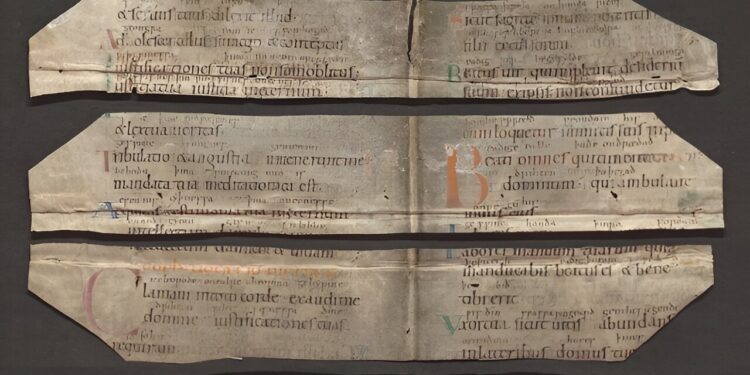Credit: Regional Archief Alkmaar
A special discovery was made in the regional archives of Alkmaar: a number of book bindings from the 17th century contained pieces of parchment from an 11th century manuscript. The original manuscript may have belonged to a princess who fled England after the Norman Conquest.
Many books were printed and bound in the 16th and 17th centuries. Bookbinders used parchment to strengthen the bindings of their books; this material was expensive and that is why people often chose to cut up old medieval manuscripts. These were often manuscripts that had lost their value: books that were too Catholic or written in a language that could no longer be read.
Something very special was found in several book bindings from the Alkmaar regional archives: 21 fragments of an 11th-century manuscript, a nearly 1,000-year-old Latin psalter with Old English glosses. Thijs Porck, lecturer in medieval English in Leiden, participated in the discovery and analyzed the text and the provenance of the fragments.
Reading Between the Lines: Old English Glosses in a Latin Psalter
Old English was spoken between about 500 and 1100 and is very similar to German, Frisian, and Dutch. This is clear from the fragments discovered at Alkmaar, in which an Old English translation was written above each Latin word: “ælce dæg” above tota die; “utgang wætera” above exitus aquarum; and “halig” above sanctus. These Old English glosses probably had a didactic purpose: with this help in translation between the lines, the user of this psalter could learn Latin.
For researchers, the discovery of a total of more than 500 Old English glosses in Alkmaar is significant because they tell us more about the language of early medieval England. For example, the fragments contain a number of word forms that do not appear anywhere else, including the word “gewændunga” for the Latin concussem “movement” – here you may recognize the Dutch word wending “to twist, turn “.
Original owner of the manuscript: A refugee princess?
Porck’s research shows that the book was bound in Leiden around 1600, but how did a Leiden bookbinder come to own an 11th-century English manuscript? It is known that around the middle of the 16th century, manuscripts from England were shipped to the continent by ship, so that they could be reused by bookbinders and soap makers. It is quite possible that the manuscript containing the Old English glosses was included among these, but there is also a second theory.
It may well be the long-lost Psalter with Old English glosses that belonged to Gunhild, an English princess who fled to the continent after the Norman Conquest of 1066, taking with her her Psalter with Old English glosses . Gunhild died in Bruges in 1087 and donated her psalter and other treasures to the Church of St. Donaas. There his psalter was last seen in 1561 and described as a psalter with English glosses “which cannot be well understood here”.
Since then, all traces of the Gunhild Psalter have been lost, but Porck managed to discover that the books of the Donaas church had been confiscated by the Calvinists in 1580: with the useful books they founded a public library, but d Other, useless books were sold. A psalter with incomprehensible glosses must have belonged to this last category: is this how the psalter finally ended up in the hands of a bookbinder from Leiden? Maybe it is. Perhaps the fragments found in the bindings of the Alkmaar books belonged to a royal book!
Porck’s article, with analysis, editing and images of the Alkmaar fragments, was published this week in the journal Anglo-Saxon England.
More information:
Thijs Porck, Newly Discovered Pieces of a Brilliant Old English Psalter: The Alkmaar Fragments of the N-Psalter, Anglo-Saxon England (2024). DOI: 10.1017/S0263675123000121
Provided by Leiden University
Quote: A princess psalter found? Pieces of 1,000-year-old manuscript found (January 11, 2024) retrieved January 11, 2024 from
This document is subject to copyright. Apart from fair use for private study or research purposes, no part may be reproduced without written permission. The content is provided for information only.



